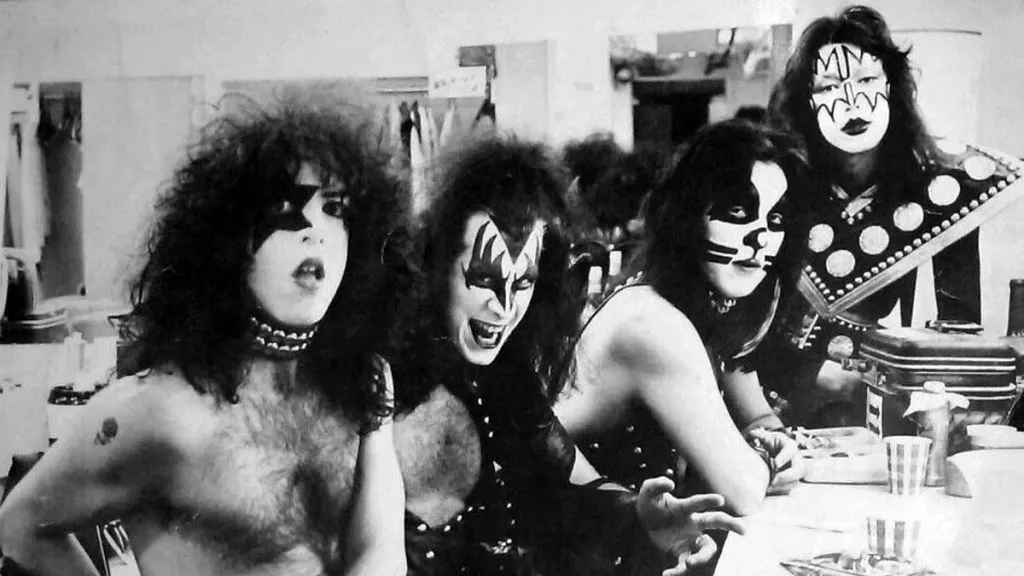KISS Settles Contentious COVID Lawsuit with Hair Stylist


Photo Credit: KISS for Casablanca Records, 1975
KISS members settle a wrongful termination lawsuit by a former hairstylist who complained about ‘unsafe working conditions’ during the COVID pandemic.
KISS members Gene Simmons and Paul Stanley have settled a wrongful termination lawsuit filed by their longtime hairstylist. David Mathews accused them of firing him after he complained about “unsafe working conditions” during the COVID pandemic.
Attorneys for both sides told a Los Angeles judge on Monday they had resolved their dispute, for which a jury trial was set to kick off later this month. Terms of the agreement were not disclosed in court filings.
Mathews had claimed he was abruptly terminated in 2022 after working as the band’s wig stylist for over 30 years. He sued the band in 2023, alleging his firing was in retaliation for repeatedly raising concerns about the rockers’ allegedly lax approach to worker safety during the pandemic. Mathews raised concerns that he was forced to work in close proximity to band members even when they were visibly sick.
“He was coughing and blowing his nose in the dressing room while still insisting that he felt fine,” Mathews’ attorney wrote of Simmons. “Mr. Mathews was required to be in Mr. Simmons’ presence to perform his job duties.”
The band is also notably facing a wrongful death lawsuit from the family of longtime guitar tech Francis S. Stueber. Stueber died in 2021 while quarantining in a hotel room. His family claims the band ignored their own safety rules and failed to arrange medical aid for Stueber after he became ill.
Mathews’ lawsuit also includes his own account of Stueber’s death, and that he had repeatedly warned the band and their manager, Doc McGhee, “the man needs to go to the hospital.” When Rolling Stone initially reported the incident, Mathews said the band accused him of leaking information to the publication, which he denied.
With the trial date fast approaching, Judge Armen Tamzarian had reportedly urged both sides to strike a deal, stating that the case presented “very serious risks” for both sides if it went before a jury.
Link to the source article – https://www.digitalmusicnews.com/2025/01/07/kiss-settles-contentious-covid-lawsuit-with-hair-stylist/
Recommended for you
-
Lyre Harp, AKLOT 16 Metal Strings Mahogany Body Lyra Harp with Maple Saddle Carved Note Tuning Wrench Pickup Strings and Black Gig Bag
$79,99 Buy From Amazon -
Starfavor Portable Keyboard Piano, Folding Piano Keyboard 88 Keys Full Size Electric Piano, Bluetooth Foldable Piano, Semi Weighted Keyboard 88 Key Keyboard, with Piano Stand, SP-15F
$169,99 Buy From Amazon -
Vangoa 61-Key Light-Up Keyboard Piano for Beginners, 350 Tones & Timbres, 3 Teaching Modes, With Microphone, Black
$89,99 Buy From Amazon -
Beat Maker Bundle – Akai Professional MPC X Standalone Drum Machine, M-Audio AIR 192|4 Audio Interface, XLR Microphone, and Studio Headphones
Buy From Amazon -
CME U6MIDI Pro – MIDI Interface with Router, Mapper, and Filter – Plug-and-play USB MIDI for computers – Standalone 3-in-3-out MIDI for Merge, Split, Thru
$49,99 Buy From Amazon -
Kalimba Thumb Piano,YUNDIE Portable 17 Keys Mbira Finger Piano with Tune Hammer and Study Instruction,Musical Instruments Birthday Gift for Kid Adult Beginners Professional(Brown)
$19,99 Buy From Amazon -
Behringer ABACUS Analog Music Computer Module for Eurorack
$121,90 Buy From Amazon -
Donner DED-200X Electronic Drum Set, Electric Drum Kit with Quiet Mesh Drum Pads, 2 Cymbals w/Choke, 31 Kits and 450+ Sounds, Throne, Headphones, Sticks, USB MIDI, Melodics Lessons (5 Pads, 4 Cymbals)
$459,99 Buy From Amazon













Responses